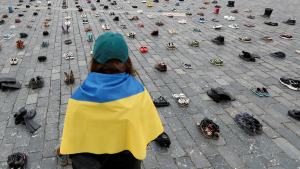Why the Goals of the War Look Different in Kyiv
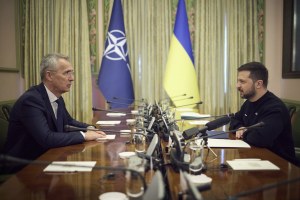 Play Podcast
Play Podcast
About the Episode
While the West focuses on Ukraine’s counteroffensive, the stakes look very different inside Kyiv. Fresh from a visit to the capitol city, Council President Ivo Daalder joins former Ukrainian diplomat Iuliia Osmolovska to share Ukrainians’ focus on the long term: integration with the West, consequences of the war, and what comes after.
[Brian Hanson: INTRO: This is Deep Dish on Global Affairs going beyond the headlines on critical global issues. I'm your host Brian Hanson with the Chicago Council on Global Affairs.
There's a great deal of coverage of the Russian War in Ukraine in western media, and largely it focuses on military issues, armed supplies from Western countries, and reports on battlefield progress as a way to predict the outcome of the war. And indeed all these factors are important, but they aren't the whole story. Today we're gonna get an on the ground perspective from Kyiv to learn what's missing from our daily reporting, what we need to know in order to understand the most important realities that are going to determine the outcome of the war, it's long-term effects, and what should be shaping the policy agenda in the west.
As it turns out, in many ways, the war, the priorities, they look differently when seen from Kyiv. And while all eyes in the West have been focused on the highly anticipated counter offensive the focus in Kyiv is on Ukraine's integration into the West in the long run, and about the consequences if this doesn't happen.
To discuss these issues today I have with me Ivo Daalder. Ivo is the president of the Chicago Council on Global Affairs, and he formally served as the US Ambassador to NATO. Ivo just returned from an intensive two day trip to Kyiv.
I also have with me Iuliia Osmolovska. She is a former Ukrainian diplomat and currently head of the Kyiv office of GLOBSEC, a non-governmental nonpartisan, independent global think tank. She joins us from Kyiv.
Iuliia organized the trip that Ivo just participated in, which she brought influential non-governmental officials from the West to Kyiv to witness the situation firsthand. I started this conversation by asking why it's important for people from the outside to actually come to her country and what they gain from being on the ground. She said that this sort of non-formal diplomacy is exactly what Globe Tech is known for…]
Iuliia Osmolovska: Why it is important for us, uh, first and foremost, it is the opportunity for people, to have this personal contacts. with an extended network that they have with their own governments to talk to our people from the government directly and to see the real concerns, which sometimes probably not be possible to discuss, in open public or official public statements. But when you develop this personal chemistry via personal contact here and behind closed door, and especially when we emphasize that this is Chatham House rules. So this provides, our guests and friends whom we bring to Ukraine with more comprehensive knowledge and understanding of what's going on really in Ukraine. For them to be able two highlight, the impressions and assessments that they've got personally in Ukraine and to present as, uh, their point of view, which for us is important because we bring in very influential people whose words really matters.
Brian Hanson: That's very helpful and sets a great context for the conversation we're about to have and, Let me just pick up on that with my first question for you, Ivo, which is, you know, the dominant narrative that we hear in the press here is very much focused on the military situation, the Counteroffensive, which is frequently framed in very decisive terms, right? That what happens this spring could be decisive militarily and affect the outcome of the war. could you share Ivo kind of your impressions of where you think that narrative is helpful and what are the important pieces that are missing that, were clearer to you from your time on the ground?
Ivo Daalder: In term of the narrative is there tends to be this idea that there is a war that started on the 24th of February, and the only question is when is it gonna end? And so much of the Western debate is about how, one can respond to the Russian aggression of February 24th and get to a situation in which we can have peace negotiations, and everything will be fine. there are two problems with that narrative. One is the war didn't start on the 24th February, 2022. It started in February 20, 14. When, Russia first invaded, Ukraine annexed Crimea, fostered a revolt, directly by participating in parts of Eastern Ukraine. And that war's been going on, up and down in one form or another ever since. Nor is that war gonna end anytime soon. Not only because, the fighting is unlikely to end, but even if the fighting will end, the conflict will remain because Russia wants to dominate, control, Ukraine, either directly by, absorbing it into, the Russian Empire or indirectly by making clear that it calls the shots on what happens in Kyiv. So even if Ukraine succeeded in its counter offensive to push Russian forces all the way back to the 1991 borders, which is going to be difficult. the conflict will remain, and the discussion in Kyiv that we were talking about was. Yes, the short term and the counter offensive is important. Yes, providing military assistance to Ukraine is vital, but what really matters is the long term and the political relationship between Ukraine and the West, cuz that's going to determine how Ukraine will turn out. Uh, and that's a different way of, approaching the conflict than we see, on our television screens or, uh, read in our papers on a day-to-day basis.
Brian Hanson: And Iuliia, let me bring you into that discussion about what are the possibilities that are desired from, the point of view of Kyiv for how Ukraine, what Ukraine's relationship with the West is, after this war?
Iuliia Osmolovska: We are confident that, our future lies, definitely in European and your Atlantic family. Uh, I can give you my personal example, as a diplomat. I always been standing for negotiable solutions and before 2015, I was pretty determined that if I were the president of the country, I would never raise this issue of going eastwards or westwards because we used to have quite, polarized views with regard where the country should drift. But me personally right now, I'm, the most enthusiastic, supporter of Ukraine's being a NATO member. Why? Because we understand that if the country preserves it in neutrality, and, uh, the country won't be feeling secured with such a big and powerful and assertive neighbor that Russia is. And, uh, I'm not the only one who actually changed its point of view, uh, the polls, 87% of Ukrainians currently support Ukraine's membership in NATO and this portion, of population is rising in the East. Surprisingly, right now we have, almost around 70% of people in the east who support this idea. And before the war, before the full scale invasion, it had been in between 40 and 50%. So therefore, definitely the country's determined that we need to preserve our statehood, we need to preserve our identity and we definitely need to belong to the family of civilized, countries, which live peacefully and respect the international legal order.
Brian Hanson: Ivo bringing it back to you in something that you said earlier, which was, the war ending isn't the end. As former NATO ambassador, could you talk a little bit about what kinds of security arrangements could be possible in order to be able to provide Ukraine with that kind of security in the longer run?
Ivo Daalder: Well, the easiest way, and the most direct way would be for Ukraine to become a member of NATO, an organization that now has 31, nations as its members. Most recently, Finland, decided to join, after a hundred years of neutrality, an alliance that would provide it with protection because of the threat that Vladimir Putin post. In Finland's mind, not only to Ukraine, but to Finland and indeed to Europe. Sweden has also now, after 200 years of arm neutrality, decided, to join and Ukraine wants to be part of this Euro-Atlantic family of nations and wants to be part of the European Union. Uh, no country has joined the European Union since the end of the Cold War without first joining NATO, unless it was a neutral country. And as a result, NATO is the best and easiest way to do that. However, you can't just join NATO because you want to, it's not like, you pay your subscription and, it comes in the mail. The members of NATO have to agree. They have to agree that they want, Ukraine as a member and in order to agree, they will have to agree that they're willing to defend it. And so far up to today, there is no agreement among all 31 members that they want to have that obligation. Many of Ukraine's neighbors. Indeed, are pushing very hard for Ukraine to become a member of NATO but those countries that are located a little further away, including, by the way the United States, are not yet prepared, to go down this road of bringing a Ukraine into NATO. And so the real question is how do you provide for the long-term security of Ukraine, whether that's within NATO or outside of NATO, so that Ukraine, on the one hand can feel confident that its security will be guaranteed not only by having the kind of assistance that is happening now, but also by the fact that Russia would be deterred, would, decide that the cost of continued aggression or renewed aggression is just too high. That's the question, that people have to focus on. That's what the long term is about. and it is in part, deeply political issue that requires engagement with, not just Ukraine, but frankly, uh, within our own including in the United States.
Brian Hanson: And Iuliia, as you've been interacting with people. From the West and from these countries that need to be part of a process that would provide some sort of security assurance for Ukraine. What's your sense of the understanding that other countries have of the priority of this issue. It seems so much of the reporting is short term on the war on material, but this is really a much more fundamental long term issue. Is it recognized, as being important? Um, and, and what's your sense of what Ukraine can do to help elevate the importance of this issue?
Iuliia Osmolovska: We definitely need to raise awareness on the information sharing about the mindset and mentality of Russians first for our Western partners actually to understand that, as you, you've rightly said, the war is not going to stop when Ukraine wins this, active phase of war, first and foremost because, Russians already feeling themselves being humiliated, by their similarly defeat on, the battlefield, by whom? By Ukraine, the country, they, they always used to consider as subordinated something minor. And finally they received such a blow from Ukrainians. So definitely, uh, they never give up. They never forgive us, and they never forgive our Western partners because you already a part of the team who support Ukraine actually to sustain this war. So, the revenge is something at stake for Russians, and they will definitely be considering this in one year time, in two year time, in three year times in decades. But this is something that our Western partners don't understand. Russia is more prepared. they will beef up their muscles actually after these defeats. but they will come back. Definitely, and the scale of this retaliation might be much higher than we are seeing it right now. And our Western partners definitely have to keep in mind that insecurity will be guaranteed in any other option unless Ukraine is NATO member. And the fear that we see right now or some reluctance of our Western partners to accept and understand this lies in the fact that they don't know what to do or what will happen with the defeated Russia. Like, will it fall apart? Will regime change? and actually on this, we are trying to suggest some of the solutions by showing different scenario building, how Russia might look like after this defeat in the war with Ukraine for our western partners. And to consider the future with some degree of certainty rather than just closing their eyes. and the staying in fear that, they don't know what this huge monster will decide to do in return.
Ivo Daalder: Brian, let me add, because I think Iuliia is rightly focusing on one part of the equation, which is what will happen with Russia and how will Russia post, uh, fighting, and it's not really a post-war or a post-conflict, but a post fighting, situation evolve. That's one part of it. The other part that frankly struck me, and was different, and I hadn't really thought about before I went to Kyiv. And I think is equally important is what happens to Ukraine if it's not a member of NATO or doesn't have, the kind of security guarantees, that it will need, And then one of the striking sentences that, that, a senior official mentioned, he said Ukraine will survive, but the most difficult point will come after, after the war. And the reality is that if Ukraine is integrated into, Europe and the Euro-Atlantic family of nations, it will focus on how to develop itself, economically, how it can recover, uh, how it can become a vibrant, prosperous democracy. And if there is no prospect of Western integration, then Ukraine will have to take care of itself because it lives in a very insecure neighborhood as Iuliia rightly said. So, it will try to arm itself to the teeth that will become a militarized, society focused fundamentally on its day-to-day security in which first and foremost, its security, is most important. It will try to undermine the threat from Russia, by trying to weaken it, through all kinds of ways. Think of Ukraine after the fighting, like Israel, some ways Israel's a society that is very much focused on its own defense. Certainly, it was, in the immediate aftermath of the 1967 and 73 wars in which the fundamental focus of society is how do we make sure that if we are attacked, we win. And it changes the behavior in terms of how Israelis are dealing with the occupied territories, or indeed the kind of, military actions that they, will take in order to defend themselves against, Iran, against Syria, et cetera. And that's how Ukraine would evolve and no one wants that, least of all the Ukrainians. and, we need to think about, our role in helping Ukraine, not only in terms of how can we dissuade Russia, but how do we make sure that Ukraine. becomes part of the Western family and it can actually benefit, and we all can benefit, from that. That's a different view I think than frankly I had before I went there. And I think it's important that we recognize that.
Brian Hanson: So Iuliia, let me ask you about that, cuz that's really fascinating. And, and you know, this war has been framed so strongly here in terms of values and supporting a democracy and, wanting to see a thriving democratic open Ukraine come out of this war. And, Ivo paints, concerns about, a different version, uh, that has happened in other places. One of the other mechanisms we talked about, NATO and providing those security guarantees, but I was wondering, to what extent does the EU and the potential relationship with the EU offer some ability to reconnect reinforce those sets of values that, we share together and that we hope, uh, that Ukraine will come out of. Does that play an important role in this, or is it so dominated by security that, a real limit to what can happen otherwise? Is the EU important?
Iuliia Osmolovska: Not exactly actually, but let me, tell you very fundamental thing, that would give you an answer and understanding of, the impressive degree of resilience of Ukrainian society in this war, So it is a fundamental of total defense of the society when the whole society stood up against an aggressor Putin, pretending to teach Ukrainians how to govern their country, how to choose their leaders, how to build, the processes of administration in the government and so on. Yes, we do understand that our choices of leaders might not be the perfect ones always. We also make mistakes, but these are our mistakes, and we want to have this. freedom actually to make this choice our own. And what did he say in his, uh, famous speech on 21st of, February last year? We will teach you how to govern new country. So he was, basically pointing at, uh, that our government was imperfect, and he has something different to offer to us. So, this is actually something that outraged the society. This is something that the society stood against entirely. And, this turned, uh, a lot of people who used to be quite loyal to Russia, against Russia completely because of this, dominance and desire actually to, patronize for us how to live. And this is the core essence of this European values, basically the democracy, freedom of choice, and so on. So, in this sense, our European integration inspirations, membership in EU, membership in NATO, it's like a supplementary to something that we have as a nation. We have this sense of inner liberty inside. and this is something that, uh, we will be fighting for whatever it takes and, uh, The pools that we have in Ukraine. 87% of Ukrainians are ready to fight against Russia regardless the size of assistance from our Western partners, even if the assistance will be diminishing and even if the vote takes longer, this is very important. So it doesn't mean that, Ukrainians are ready to surrender at some point because they just tired of this war. For us, it's existential war. This is something that we've seen in, Bucha, and Irpin, I had a big miscalculaiton at the beginning of the war when I said that Putin is not going to invade the country. Why? Because I saw that he has all the leverage to play in Ukraine, political leverage, big portion of Ukraine society, loyal to Russia, economic ties, a financial ties, and so on. So he had all the cards to play in Ukraine. So why, do this? Uh, because, he simply doesn't care about the loyalty of Ukrainians because he doesn't see Ukrainian as a nation. What is he doing here is just exterminating us. So for him, he needs just this territory to declare that, it is the restored Russian empire and that's it. So it's not about the nation and such, and this is something that we all of us understood very well, throughout this year of war, and therefore we understand what we are fighting for.
Brian Hanson: Let me bring it back to these questions about what can be done in the context of this war and where Western Partners should focus their efforts. What should the agenda be while the war is ongoing, while the borders are not clear what can be done, in order to advance that agenda now.
Ivo Daalder: Well, uh, I mean, they're sort of linked in, some ways, the way in which, one thinks about the future, status of Ukraine within the west and the conduct of the war, this counter offensive that is coming in one of these days will at some point fizzle out. Uh, it will end. It will either succeed significantly moving the territorial lines one way or the other, or it, will not. So, at that stage, even if it succeeds all the way to the 1991 borders, which is very unlikely, but at that stage, neither Russia nor Ukraine nor the west, will have the capacity, uh, for a very long time. years probably to provide the kind of military capabilities, necessary to move the front lines, and so we're most likely going to find ourselves in some form of stalemate afterwards. And, the question that the Ukrainians will ask themselves, are we, going to have the prospect of joining the West? Which as Iuliia rightly says, is a Ukrainian aspiration one because they think and feel like they are part of the West, and they therefore want to be part of the institutions that have defined, particularly in Europe, the West, NATO and the European Union. and, in some ways the degree to which Ukraine is determined to fight for every last inch of the territory that is its own, will depend on what the West is willing to do, to provide for the security prosperity of Ukraine by integrating it into the EU and NATO, and that's how I think we need to start thinking about it. But how much you fight for that return and how long you fight for it, will depend on what a degree of security is provided by having a partnership or being a member of NATO and being a member of the European Union. And that's how we should start thinking about that. And so what does that mean for the United States? What does it mean for Europe? It means that the European Union accession process needs to proceed. Ukraine is hoping that formal negotiations will be open this year. Next year will be a difficult year. The parliamentary elections in the EU, there are leadership changes and so opening it up this year is absolutely important. And then work through all of the steps to become a member of the European Union, which will take years -- this is a very long. And then second, you have to think about security. and if it isn't NATO membership, At the beginning, there are other things that we can do, in the meantime, one of which is to formalize the kind of security assistance that, we have been providing over the last, 15 months. make sure that we will always commit to providing Ukraine with the means to defend itself. The second is to have a serious discussion about security guarantees that is, what circumstances, would, force, those who are providing those guarantees, to come to the defense, the actual defense. And what would that mean? does it mean, sending thousands of troops, does it mean providing air cover? Does it mean sending air defense systems? All of these things are up for discussion. We're not having any of these discussions, and as long as we don't have these discussions, Ukraine will be determined. Rightly to say, well then we'll have to figure out how to do it ourselves, militarily. So, there is a dynamic here that we can influence and, idea that somehow the war will end because the fighting, will be stalemated, and we'll have a negotiation, and everything will be fine. Well, maybe, but it will only be possible to have that negotiation. If there is some certainty in Ukraine about what its future status is within, the Western, family of nations.
Brian Hanson: And Iuliia, let me ask you, Ivo laid out a whole set of processes, some of which take a long time, some of which can be done a little more quickly. But what for you do you believe are the most important indicators for Ukraine that things are moving in the right direction that you believe that Western Powers ought to be doing now?
Iuliia Osmolovska: So basically, whatever Ivo described, this is something that is already, uh, on the agenda of, uh, Talking about security guarantees. And this bilateral commitments with different countries signed, uh, under umbrella of Kyiv Security Compact, which is currently negotiated, uh, of, our government with the partner countries. And this is just to fix the status quo. It's not the commitment that, uh, Ukraine would expect any, uh, national regiment of NATO troops coming, to Ukrainian land and defend our territory.
But we need to have something more, more definite, more determined. Once we see this more, upgrade language of, naiveness Summit with regard to Ukraine, then we will see that, things are moving in the right direction. But let me then suggest you to consider the situation. Not from the profit benefit staff, but rather from costs and losses. What will happen if, The Western partners are not able to deliver, is half of Ukraine would, try to solve the issue of, uh, its, security fragility, by our own means. So definitely you also probably were of a lot of, uh, Politicians and voices from the Ukrainians raising, the question why we given up, the nuclear arsenal. We need to, develop it again for self-defense. What will happen if Ukraine is not, eventually joining the NATO, the Euro, Atlantic, uh, structures. So basically, suggest that Ukraine is not winning in this war. The government change in Ukraine, the government has changed in Russia, and the new government in Russia decides, to actually bring Ukraine closer by saying that. You see, you've been betrayed one more time by Western partners. They left you alone. So why not actually come together and in the United Family of Nations and then this big, huge monster comprising of Russia, Ukraine, newly Ukraine with newly pro Russian oriented government, uh, and Belarus would be developing the military capacities actually for this bigger revenge against West and all this entire territory will be moving westwards at some point in 10 years time So this is a nightmare scenario, but, it could be easily plausible if you consider that. we won't, have answers to the main question where Ukraine belong to? So definitely we belong to the family of nations who share the same views on life, uh, values. As I said, the core. DNA it's liberty of choice and which, which is the fundamentals for democracy.
Brian Hanson: Iuliia Osmolovska of the GLOBSEC office in Kyiv and Ivo Daalder of the Chicago Council and Global Affairs. This has been a really fascinating, as well as sobering, conversation in which you both made it clear that the consequences of not dealing with the integration of Ukraine into the West and providing the security for that country can have serious consequences. Thanks for being on Deep Dish and helping us understand these issues from inside Kyiv.
Ivo Daalder: Thank you.
Iuliia Osmolovska: Thank you.
[Brian Hanson: OUTRO: And I wanna thank you for tuning into this episode of Deep Dish!
As a reminder, we wanna hear more from you, our listeners! So, send us an email, or better yet, a voice memo to deepdish@globalaffairs.org -- You can suggest issues that you'd like us to cover, guests that you'd love to hear from, or you can just let us know how you think we're doing.
And if you're looking for more Deep Dish in your podcast diet, tap the follow button on your podcast app so you can get each and every new episode as soon as it's released. If you think you know someone who would enjoy today's episode, please share it with them.
As well as a reminder, the opinions you heard belong to the people who express them, and not the Chicago Council on Global Affairs. This episode is produced and edited by Kyra Dahring and mixed by Frank McKearn at Aphorism Productions.
Thanks for listening. I'm Brian Hanson and my co-host, Lizzy Shackelford, will be back next week with another slice of Deep Dish.]
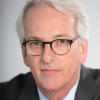





Related Content
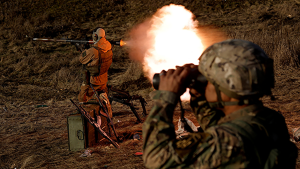 US Foreign Policy
US Foreign Policy
"The West needs to contemplate a world in which the conflict continues with neither victory nor peace in sight," Ivo Daalder and James Goldgeier write.
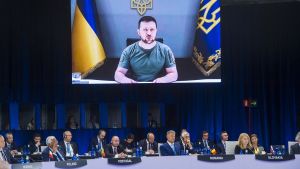 Defense and Security
Defense and Security
If Russia does ultimately lose the war, Nonresident Fellow Paul Poast argues, it will be a great victory for the West and NATO.
 Public Opinion
Public Opinion
In countries that favor a negotiated end to the conflict, support for specific policy measures that aid Ukraine has fallen.
